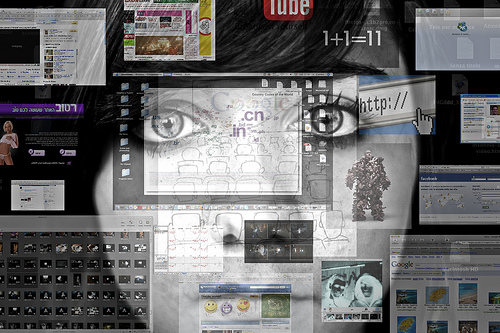Naked Lunch
by Israel Centeno and translated by Kelly Harrison / July 16, 2013 / 1 Comment
Despite the Internet’s apparent democracy, the world’s agents of power are still in control. They sell us our freedom, our entertainment, like a drug.

The Internet allows individuals to be part of transformative phenomena-and creates an illusion of freedom and truth. Photo: Federico Morando via Flickr.
The illusion of freedom and the media’s attention to the sensation of the masses—who flaunt themselves in the global public eye and compulsively update their info on social networks—make up the new stage for the world’s agents of power.

- From his lonely watch post Albert Camus asked who among us has not experienced exile yet still managed to preserve a spark of fire in their soul. “We’re all alone,” Natalia Sedova cried in exile on hearing of her husband Leon Trotsky’s affair with Frida Kahlo. In his novel Night Watch, Stephen Koch follows the incestuous love affair of David and Harriet, wealthy siblings watching the world from their solitary exile. Koch’s writing, Camus’s theories, and Trotsky’s affair all come back to exile and lead me to reflect on the human condition. From my own vantage point, my Night Watch, I will reflect on my questions of exile, writing, and the human condition.

- Israel Centeno was born in 1958 in Caracas, Venezuela, and currently lives in Pittsburgh as a Writer-in-Residence with City of Asylum/Pittsburgh. He writes both novels and short stories, and also works as an editor and professor of literature. He has published nine books in Venezuela and three in Spain.
Mobile technology is a whirlwind, integrating into all platforms at a dizzying rate. Channels are getting old, senders are mistaken for receivers, and contexts have become blurred, making it practically impossible to re-create Jakobson’s model. In this state the subtle agent appears and says that nothing is happening now which hasn’t already; you just have to look for different perspectives and distinguish between the channels. The modernists at the turn of the last century demonstrated that their new structures eclipsed the distance between sender and receiver, and broke or destroyed scenographic Euclidean space: Profound, homogeneous, comprising selected shots…the subtle agent understands that from now on, we will be positioning the audience within the scene. The observer has now become one with the space, incorporated into it. His unique point of view vanishes and becomes absolute. The lords of media and the leaders, despots, and democrats claw their way onto Twitter or Facebook, pretending to abandon their omniscient publishing lines and disguise the beat of their one-way drum with horizontalism. But the truth is simply an illusion of freedom and truth, since the power structures continue to determine the story of reality.
And what about the average user, the man on the street, the individual who seeks to be part of a significant and transformative phenomenon?
Opinions are divided. Some maintain that you could construct networks and bring about change from the bottom up, or in a lateral way; if so, this would revolutionize power relations. In all honesty, people strive to work and create—for instance, citizen journalism, social accounting, movements of opinion, and NGOs—as well as to encourage real-life demonstrations on social networks. Many participate in these phenomena with the seriousness of a crusader; sometimes there is not even room for humor, for fear of undermining the gravity of such important matters.
Yet, the agents of power stand by the idea of a mutating illusion. Once the innovative euphoria is over, once the total freedom of expression, experiences without limits, proximity to and demythologization of icons, unbridled solidarity, and sensitivity come to an end, the normative energy of the factors of power becomes invisible, and the hand that rocks the cradle starts to shape this intangible force, contextualizing and granting the corresponding status quo. Now omnipresent online, the well-positioned agents redefine power relations. Consequently, the enthusiastic freedom movement, anarchist in the truest sense of the word and dangerously subversive, ends up being crushed, twisted, and ruined by an absolute watchdog.
As a result, the online space becomes more and more submissive, and in this democratization of horizontalism, little by little, a dedication to hedonism, self-referential seduction, a morbid fascination with reality shows, and compulsive gossiping set the pace: We are confronted with an impenetrable racket in which the need for important media becomes a need for increasingly irrelevant media. Must we be substantive at all costs? The agents of power will plant the seeds of doubt.
Those who take part in these media phenomena will imitate brokerage firm staff, compulsive gamblers in casinos, and users of stimulating, addictive, and distressing drugs. The agents will decode the emoticons and the video links: Online privacy and loneliness defeated, the poison will flow in, like injections straight into the thickest veins of the soul.





One Comment on "Naked Lunch"
It reminds me of Infinite Jest (David Foster Wallace) (As a literary example).
“The agents will decode the emoticons and the video links: Online privacy and loneliness defeated, the poison will flow in, like injections straight into the thickest veins of the soul.”
I agree.
Also, I think we are (at least, sometimes I am) kind of naive if we think that the global powers don’t attach total control even in the Internet.
I got to read again Brave New World and 1984.
We are amusing ourselves to death (like the title of the essay by Neil Postman)